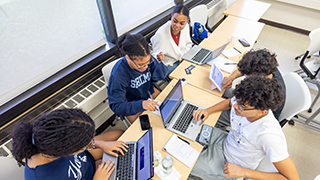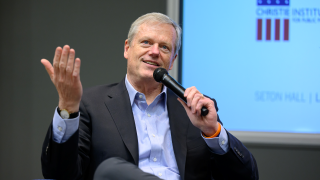Academic Champion Scores Silver at NCAA BIG EAST Research Symposium at MSG
Wednesday, March 20, 2024
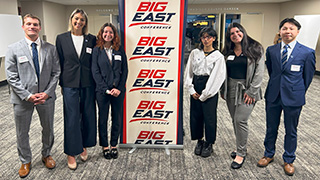
Seton Hall Champions (left to right), Zachary Sylvester, Sarah Frie, Melissa Myrtaj, Sadia Raza, Mary Elias, and Jonathan Zhang.
As the NCAA BIG EAST Men’s Basketball Tournament Conference rivalry was ongoing, Setonians cheered another BIG EAST Tournament taking place at Madison Square Garden in New York City – this one celebrating student scholarship. In an historic first, Seton Hall’s own Jonathan Zhang scored a Silver Medal to come in second place out of the 55 projects in competition at the third annual BIG EAST Research Symposium on Saturday, March 16, 2024.
The BIG EAST Undergraduate Research Poster Symposium brought together the 11 BIG EAST Conference institutions in a competition of the minds, where judges from the member institutions examined the student research poster presentations on a variety of academic metrics. In its third year, the symposium was held at the Garden before the BIG EAST Championship Finals that evening.
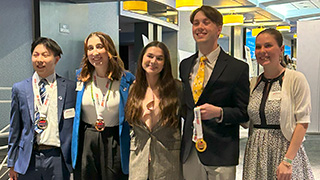
From left to right: Jonathan Zhang, Silver Medal, Seton Hall University; Grace Jaworski, Bronze Medal, Creighton University; Elsa Hahn and Zac Nelson, Gold Medal, Marquette University; and Katie Kudla, Providence College, honorable mention.
In addition to Jonathan’s achievement, Elsa Hahn and Zac Nelson from Marquette University received the Gold Medal, Grace Jaworski from Creighton University received the Bronze Medal, and Katie Kudla from Providence College received honorable mention.
"The provosts of the BIG EAST institutions, including our current Interim President Katia Passerini, initiated and implemented the Undergraduate Research Symposium at the annual BIG EAST Conference," stated Professor Jose L. Lopez, Department of Physics, director, Office of Grants and Research Services and Petersheim co-chair. "Their initiation has paved the way by which our Expo research has advanced beyond Seton Hall and enabled our students to share their research and network within the BIG EAST family,” added Professor Sulie Lin Chang, Petersheim co-chair, director of the Institute of NeuroImmune Pharmacology.
To demonstrate their skill and academic prowess, Seton Hall undergraduate students and 2023 recipients of the Petersheim Academic Exposition Student Travel Awards Mary Elias, Sarah Frie, Melissa Myrta, Sadia Raza, Zachary Sylvester, and Jonathan Zhang had been gearing up for months before the competition. The six Seton Hall students represented five research groups and were selected from last year’s group of Petersheim Academic Exposition winners.
To energize them and help with prep, these six BIG EAST scholars received hands on mentorship and coaching by Professor Caryn Grabowski, director of experiential learning, Office of the Provost; chair and program director, Department of Speech-Language Pathology, School of Health and Medical Sciences, and Sona Patel, interim assistant provost for Academic Excellence and Assessment, and associate professor, Department of Speech-Language Pathology, School of Health and Medical Sciences.
"This is an incredible accomplishment as the field of 55 projects was filled with exceptional work and the 'best of the best' among the institutions in the BIG EAST conference. We are thrilled for Jonathan’s achievement and it was meaningful to see the support and enthusiasm among his fellow team members from Seton Hall as well," said Grabowski.
A Superstar Roster
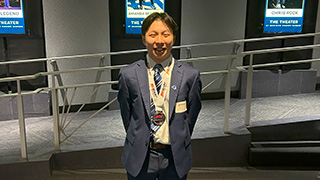
Jonathan Zhang receives a historic BIG EAST Silver Medal.
Second-place medalist Zhang, Biology major and pre-medicine junior with senior standing, is in the joint Bachelor of Science in Biology/Doctor of Medicine program, and an early career investigator at the Institute of NeuroImmune Pharmacology (INIP). He plans to graduate in May and continue his academic journey studying abroad and conducting research in Taiwan at the National Health Research Institute in the Fall.
An aspiring physician-scientist with an unwavering commitment to lifelong learning, he returned for his second tourney at the BIG EAST research symposium with "Cold Plasma Reverse Wound Healing Impairment in Alcohol Intoxication." His primary research focus is on COVID-19 and its neurological manifestations. He has attended the Society for Neuroscience Conference in Washington, D.C. and received a prestigious travel award to attend and present at the 2023 Alcohol and Immunology Research Interest Group (AIRIG) Meeting sponsored by the National Institute on Alcohol Abuse and Alcoholism (NIAAA) in Denver, Colorado. He also received 2nd Place at the Senior Academy Poster Presentation at the 68th Annual New Jersey Academy of Science Annual Meeting and Best Genetics Poster Presentation Award at the 76th Annual Eastern Colleges Science Conference.
An early career investigator conducting research at the esteemed Institute of NeuroImmune Pharmacology (INIP) in his freshman year under the mentorship of Sulie Lin Chang, he actively contributed to a diverse array of projects, ranging from investigating addiction in HIV transgenic rats to studying binge ethanol-induced spleen atrophy to exploring the effects of cold plasma on wound healing.
"I was honored to be selected to represent Seton Hall again this year at the BIG EAST Research Symposium and share my award-winning research on cold plasma. My research integrates three studies: the bioinformatic approach to understanding the mechanisms and signaling pathways involved in cold plasma and ethanol on wound healing, the cell culture proof of concept study to explore the beneficial effects of cold plasma to attenuate the negative effects of ethanol exposure on wound healing, and the transcriptomic analysis to examine the genetic changes associated with cold plasma exposure," Zhang explained.
Over the summer, the collaboration between INIP and the Laboratory of Electrophysics and Atmospheric Pressure (LEAP) offered him an invaluable opportunity to research cold plasma and its effect on wound healing. Tying into his previous research on drinking and alcohol exposure, he examined how cold plasma could repair the detrimental effects of alcohol exposure on wound healing. He also worked as a Scribe Special Operations Ambassador to implement a scribe team for the oncologists at the Rutgers Cancer Institute of New Jersey and received invaluable insights into both inpatient and outpatient healthcare settings. He worked closely with healthcare teams and patients in cardiology offices, oncology offices, and as well as one of the busiest emergency departments at Montefiore Medical Center.
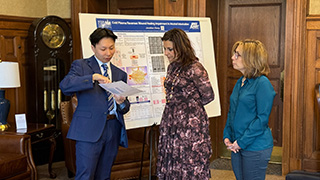
Interim President Katia Passerini, center, coaches Jonathan Zhang. Lisa Metz offers encouragement.
"I envision myself as a future leader, physician and researcher, dedicated to making a significant global impact," he said, adding "I personally want to thank Interim President Katia Passerini, and my mentors Sulie Chang and Jose Lopez for their astute observations and coaching to help me achieve this milestone."
"It has been a great joy to observe how this very talented BS/MD student has transformed himself via learning, working and completing various research projects. Jonathan has developed himself into a well-rounded, exceptional junior with senior standing who represents Seton Hall University to present his research projects by integrating both in-vitro and in-silico approaches. We at INIP are very proud of him and now seeing his research receiving this high honor by his peers at the BIG EAST schools is hugely significant," shared Chang.
Mary Elias, a senior chemistry student and president of the Student Alumni Association, explained that joining Professor Sergiu Gorun’s inorganic chemistry research group was "truly one of the most influential decisions of my life," enabling her to "grow tremendously as part of this team," working alongside undergraduate students, graduate students and post-doctoral students. Gorun, her academic mentor, is a professor of Chemistry and Biochemistry, and director, Center for Functional Materials.
Her research project is "The Photooxidation Kinetics Dependency on Wavelength and Light Intensity" and her specific research focus within this project is to determine which light wavelength and intensity is optimal for degrading toxic substances the fastest. The overall purpose of her research is to invent new ways to destroy toxic substances that can harm people and the environment. For some of these substances, the antidotes are unknown and thus they represent a danger for our populations and for those who defend us from being harmed. This elimination of toxic chemicals is done using just two things: solar light and oxygen. Her work was inspired by medical techniques used to cure cancer using light and oxygen as well, and so our molecules cure cancer this way, too.
The research is supported by the U.S. Defense Threat Reduction Agency as part of the Department of Defense, which she reports "has allowed my passion for chemistry research to grow even more."
"Being awarded the Petersheim Student Travel Award in April 2023 was an honor and showed me just how impactful my dedication to my research is, allowing me to travel to NYC and Boston to present my research. I look forward to continuing to showcase my work at this year’s BIG EAST Research Symposium, and I couldn’t be more grateful for the opportunity and for all the support I have. The scholarships and opportunities that Seton Hall has gifted me have greatly influenced my success and have enabled me to pursue higher education, as I plan to pursue my Ph.D. in Chemistry post-grad! Go pirates!" Elias reflected.
Diplomacy students Sarah Frie and Melissa Myrta researched "Water Working for Women: Irrigation Infrastructure Project in Rural Albania," which explores opportunities, barriers, project implementation and potential funders. Most farms in Albania are household-run and lack consistent water flow. This creates inefficient agricultural production, and the lack of proper water management falls disproportionately on women. This project proposal is designed to improve household agricultural irrigation infrastructures to diminish labor intensity and increase female empowerment in communities in northern Albania.
Sarah Frie is a senior double majoring in Diplomacy and International Relations and Economics with a minor in Russian and Eastern European Studies. An athlete-scholar, she is a member of the University’s BIG EAST Swimming and Diving Team and is head treasurer of Slavic Club. Melissa Myrtaj is a senior studying International Relations and Diplomacy with minors in Russian and Eastern European Studies and Anthropology. She is a research assistant at the Diplomacy Lab, president of the Slavic Club, and writer for The Diplomatic Envoy. She is an intern at the Association of Diplomatic Studies and Training and held a prior internship with the Department of Homeland Security.
"Prior agricultural developments in Albania have ignored aspects of gender inclusion, but we hope that this project can encourage female generational empowerment and more significant roles in household functions," explained Myrtaj.
"I’ve always been impressed with what Diplomacy students can do, and Sarah and Melissa’s work is no exception. What I love about this project is the way that it takes ideas and solutions based in Sub-Saharan Africa and applied them to similar challenges in rural Albania. I can’t wait to watch them present on Saturday!" said Martin S. Edwards, associate dean, Academic and Student Affairs, School of Diplomacy and International Relations.
Sadia Raza is a senior Social Work major, whose research project "Queering Decarceration: A Gender Responsive Approach to Prison Reform" has been gaining traction beyond the University.
She explained, "My research is an advocacy project on exploring the way health disparities faced by incarcerated and detained TGNC (transgender and gender non-conforming) individuals are exacerbated, in part, by the weak enforcement of federal policies and a lack of clear standardization of guidelines and definitions regarding the care of this population. I assert that social workers, due to their extensive advocacy training and professional commitment to values of perpetuating human rights and protecting the worth and dignity of every individual, are in a unique and impactful position to help facilitate the policy regulation, data collection and correctional staff training that is urgently needed to protect TGNC people in prisons."
She has been honored to present this research at the Social Work Baccalaureate Program Directors Conference in New Orleans this March as well as presenting at the Petersheim Academic Expo and she looks forward to connecting with other students and academics passionate about lasting justice reform and advocacy for the TGNC community.
Raza said, "I want to highlight that there is no one size fits all solution for this population – rather policy revisions and enforcement must focus on implementing practices that excavates space for every incarcerated TGNC person to safely articulate their specific needs and care, identify and affirm how they would like to be addressed, and enforce preventative measures that reduces the disproportionate violence experienced by this population. Furthermore, social workers must carefully consider other factors that may impact the treatment of TGNC individuals (such as race, class, and ethnicity) when conducting research, interpreting data and recommending policies."
She expressed gratitude to her mentor, Director of the BSW Program and Associate Professor Dawn Apgar, Ph.D., LSW, ACSW, and Petersheim Academic Expo planning committee member "for supporting and supervising my work and providing constructive feedback to strengthen my research!"
Zachary Sylvester, a senior pre-med Biology and Catholic Studies double major, applying to medical school, aspires to work as a sports medicine orthopedic surgeon. A BIG EAST baseball infielder and scholar-athlete, he expressed his gratitude for his teammates assistance and coaches support with his research project, "Application of Machine Learning to Predict Should Biomechanical Efficiency." Nine pitchers came to the biomechanics pitching lab to throw.
"I was fortunate for my teammates and coaches support throughout the research study. As for my research, we used machine learning to help predict the biomechanical efficiency of the shoulder for baseball pitchers. By analyzing the 3D kinematic data, we were able to analyze markers of success as well as susceptibility to injury for each of the pitchers. This data is important for coaches, players, athletic trainers and clinicians for helping pitchers succeed on the field and avoid injury. RJ Boergers was my faculty advisor. I also want to acknowledge my research partner, Michael Ciminiello, for his contributions," he said.
Reflecting on the contributions of both University BIG EAST scholar-athletes, Bryan Felt, director of Athletics and Recreation, said, "Seton Hall Athletics strives to develop student-athletes to be stars both on the field and in the classroom, and it is exciting to hear that Sarah and Zack were among those selectees to represent our University at this weekend's BIG EAST Undergraduate Research Symposium. They are two very talented student-athletes, and we are proud of the achievements of all our Seton Hall representatives!"
"This group of scholars were already involved in cutting-edge research, but over the past few months, they have also mastered the art of scientific storytelling," shared Interim Assistant Provost Patel. "Presentation preparation involves navigating extensive and sometimes critical feedback from mentors. Despite this challenge, these students came together as teammates, offering mutual encouragement and support throughout the process. We all are proud of their dedication to learning and the accomplishments they have achieved."
Categories: Education, Research




